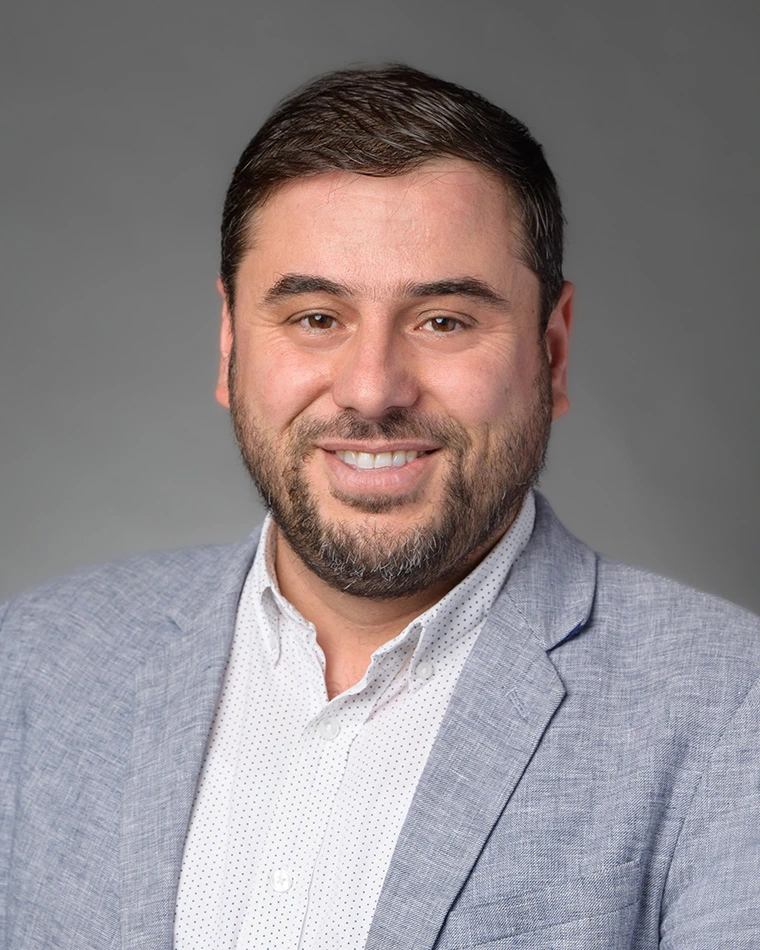Zafer Mutlu
Zafer Mutlu is an assistant professor of materials science and engineering, with joint (by courtesy) appointments in electrical and computer engineering and physics at University of Arizona, where he has been selected as a Craig M. Berge Faculty Fellow and a Center for Semiconductor Manufacturing Fellow. Before joining University of Arizona, he conducted several years of postdoctoral research at University of California, Berkeley, Lawrence Berkeley National Laboratory (LBNL), Stanford Nano Shared Facilities (SNSF), and University of California, Riverside. He earned his PhD in materials science and engineering from University of California, Riverside, along with an MS in physics and a BS in physics education, both from Selcuk University in Türkiye.
The Mutlu group focuses on three key areas: (1) the design, synthesis, fabrication, and electrical characterization of atomically precise carbon-based nanoelectronic devices, specifically field-effect transistors (FETs) using graphene nanoribbon (GNR) semiconductors, aimed at developing high-performance, energy-efficient logic technologies beyond silicon; (2) the development of topological acoustic (TA) wave phononic devices through advanced high-throughput nano- and micro-fabrication techniques to drive advancements in radio frequency (RF) technologies; and (3) advanced electrical characterization of chalcopyrite minerals to enhance our understanding of their leaching behavior, with the primary goal of optimizing copper extraction.
Mutlu's research has been published in highly respected journals and conferences, including IEEE IEDM, IEEE EDTM, ACS Nano, Journal of the American Chemical Society (JACS), Advanced Functional Materials, Nano Energy, Carbon, Small, and many others. His work is supported by a range of federal, state, and private sector sources, including National Science Foundation (NSF), Semiconductor Research Corporation (SRC), Department of Defense (DoD), Arizona Commerce Authority (ACA), Arizona Board of Regents (ABOR), Technology and Research Initiative Fund (TRIF), UA Center for Semiconductor Manufacturing (CSM), UA Research, Innovation and Impact (RII), UA Foundation, and Freeport-McMoRan.
Degrees
- PhD in Materials Science and Engineering, University of California, Riverside (2011–2016), Advisor: Professor Cengiz S. Ozkan
- MS in Physics, Selcuk University, Konya, Türkiye (2007–2009), Advisor: Professor Oguz Dogan
- BS in Physics Education, Selcuk University, Konya, Türkiye (2002–2007)
Work Experience
- University of Arizona, Tucson, Arizona
- Assistant Professor, Department of Materials Science and Engineering (2022–Present)
- Joint (by courtesy) Assistant Professor, Department of Physics (2024–Present)
- Joint (by courtesy) Assistant Professor, Department of Electrical and Computer Engineering (2024–Present)
- University of California, Berkeley, Berkeley, California
- Postdoctoral Researcher, Department of Electrical Engineering and Computer Sciences (2018–2022)
- Researcher, Berkeley Emerging Technologies Research (BETR) Center (2018–2022)
- Researcher, NSF Center for Energy Efficient Electronics Science (E³S) (2018–2021), Supervisor: Paul R. Gray Distinguished Professor Jeffrey Bokor
- Lawrence Berkeley National Laboratory (LBNL), Berkeley, California
- Research Affiliate, Molecular Foundry, DoE Nanoscale Science Research Center (2018–2022)
- Stanford University, Stanford, California
- Lab Member, Stanford Nano Shared Facilities (SNSF) (2018–2022)
- University of California, Riverside, Riverside, California
- Project Scientist, Department of Electrical and Computer Engineering (2017–2018)
- Postdoctoral Researcher, Department of Mechanical Engineering (2017–2018)
- Researcher, Center for Spin, Materials, Interfaces and Novel Architectures (C-SPIN) (2013–2017)
- Research Assistant, Department of Materials Science and Engineering (2011–2016), Supervisor: Professor Cengiz S. Ozkan
Interests
Research Interests
Nanoelectronics, semiconductors, electron devices, low-dimensional materials, 2D materials, quantum materials, graphene nanoribbons, logic technologies, topological acoustic devices, radio frequency technologies, nanofabrication, microfabrication, chalcopyrite semiconductors, critical minerals
Teaching Interests
Fundamentals of semiconductors, semiconductor processing and manufacturing, hands-on micro/nano device fabrication, fundamentals of materials science and engineering, nanoelectronics and nanoscience, solid state physics and chemistry, semiconductor device physics, undergraduate and graduate student research, more inclusive and accessible teaching
Scholarship
>40 refereed publications, >4 patents and patent applications
Courses
Semiconductor Processing
MSE/ECE 446/546 (Summer 2024)
MSE/ECE 446/546 (Fall 2023)
MSE/ECE 446/546 (Spring 2023)
Semiconductor Processing Lab
MSE 447L/547L (Spring 2025)
MSE 447L/547L (Spring 2024)
Solid State Chemistry
MSE 110 (Fall 2025)
MSE 110 (Fall 2024)
Independent Study
MSE 399/499 (Fall 2025)
MSE 399/499 (Spring 2025)
MSE 399/499 (Fall 2024)
MSE 399/499 (Spring 2024)
MSE 399/499 (Fall 2023)
Senior Capstone
MSE 498 (Spring 2024)
MSE 498 (Fall 2023)
Research
MSE 900 (Fall 2025)
MSE 900 (Spring 2025)
MSE 900 (Fall 2024)
MSE 900 (Spring 2024)
MSE 900 (Fall 2023)
Thesis
MSE 910 (Fall 2025)
MSE 910 (Spring 2025)
MSE 910 (Fall 2024)
MSE 910 (Spring 2024)

